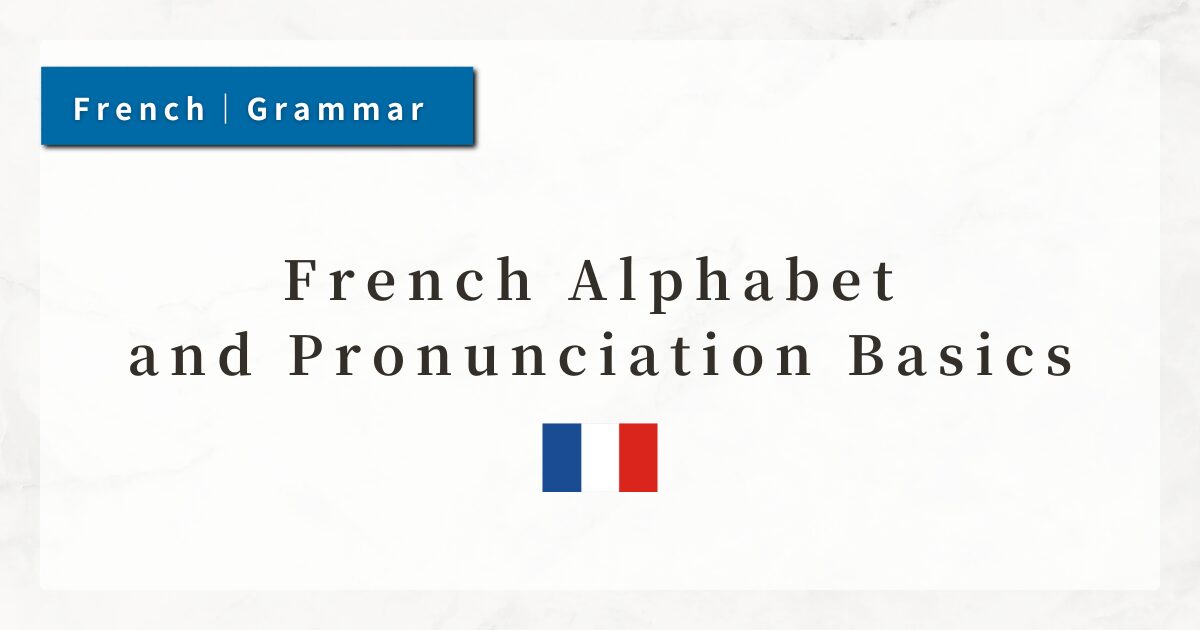#9 French First Group Verbs in the Present Tense | Conjugation Rules and Usage

Unlike English, French verbs require conjugation. Among them, the most fundamental are the first-group regular verbs, known as -er verbs.
By understanding their regular conjugation patterns, you will be able to construct a wide variety of sentences.
In this lesson, we will learn the conjugation rules of first-group verbs in the present tense, with the goal of mastering how to form correct sentences.
1. What Are First-Group Regular Verbs?
French verbs are divided into three groups, and the first group is the largest. These are verbs whose infinitive form ends in -er.
Because they conjugate according to consistent rules, they are the easiest group for beginners to learn.
- Infinitive form ends in -er.
- Follow regular, predictable conjugation patterns.
- Most frequently used verbs in the early stages of learning.
Conjugation Rules
The present tense of first-group verbs is formed by adding the appropriate ending to the verb stem, depending on the subject.
| Subject | Ending |
|---|---|
| je | -e |
| tu | -es |
| il/elle/on | -e |
| nous | -ons |
| vous | -ez |
| ils/elles | -ent |
The stem remains unchanged for all subjects.
The ending -ent for ils/elles is not pronounced. For example, “je parle” and “ils parlent” are pronounced the same.
2. Basic Conjugation Pattern
To conjugate a first-group verb, simply remove -er from the infinitive, then add the subject-specific ending.
Because of their high regularity, once you learn the pattern of one verb, you can apply it to many others.
- je + parl + e
→ je parle - tu + parl + es
→ tu parles - nous + parl + ons
→ nous parlons
3. Pronunciation of ils/elles Forms
In the third-person plural (ils/elles), verbs take the ending -ent. However, this ending is silent.
Thus, different conjugated forms may be spelled differently but sound the same:
| Subject | Conjugated Form | Pronunciation |
|---|---|---|
| je | aime | [ɛm] |
| tu | aimes | [ɛm] |
| il/elle/on | aime | [ɛm] |
| nous | aimons | [ɛmɔ̃] |
| vous | aimez | [eme] |
| ils/elles | aiment | [ɛm] |
This is why French generally does not allow omission of the subject pronoun: the verb form alone does not always indicate who the subject is.
- Ils aiment le chocolat.
(They like chocolate.) - Elle aime le chocolat.
(She likes chocolate.)
→ aime and aiment are pronounced the same, so the subject must be explicitly stated.
4. Special Spelling Changes: -ger and -cer Verbs
Some first-group verbs undergo small spelling adjustments to preserve pronunciation.
The most common are -ger verbs and -cer verbs. These changes occur mainly in the nous form.
4-1. -ger Verbs (Example: manger = to eat)
The stem is mang-, but in the nous form an “e” is inserted.
| Subject | Conjugated Form | Note |
|---|---|---|
| je | mange | Regular |
| tu | manges | Regular |
| il/elle/on | mange | Regular |
| nous | mangeons | -eons to preserve pronunciation |
| vous | mangez | Regular |
| ils/elles | mangent | Regular |
When g is followed by a, o, u, it is pronounced [g] (hard “g”). When followed by “e,” it becomes [ʒ] (soft “g,” like “zh”).
Therefore, the extra “e” in nous mangeons keeps the soft sound.
- Correct
→ mangeons [mɑ̃ʒɔ̃] - Incorrect
→ mangons [mɑ̃gɔ̃]
4-2. -cer Verbs (Example: commencer = to begin)
The stem is commenc-, but in the nous form, the “c” changes to “ç.”
| Subject | Conjugated Form | Note |
|---|---|---|
| je | commence | Regular |
| tu | commences | Regular |
| il/elle/on | commence | Regular |
| nous | commençons | c → ç |
| vous | commencez | Regular |
| ils/elles | commencent | Regular |
When c is followed by a, o, u, it is pronounced [k] (“k” sound). Adding a cedilla (ç) ensures the pronunciation [s].
- Correct
→ commençons [kɔmɑ̃sɔ̃] - Incorrect
→ commencons [kɔmɑ̃kɔ̃]
5. Summary
- First-group regular verbs (-er verbs) are the most fundamental verb group in French.
- To conjugate, remove -er from the infinitive and add endings
→ -e, -es, -e, -ons, -ez, -ent. - The -ent ending for ils/elles is not pronounced.
- Special spelling changes occur in -ger and -cer verbs, but the basic rules remain the same.




